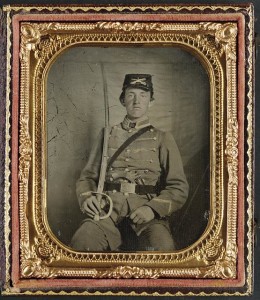Up in New York State plans were in the works to pass legislation and/or amend the state constitution to allow New York soldiers to vote in the 1864 elections. Virginia already allowed soldiers to vote in the field, and a Richmond newspaper determined that the troop tally would be decisive in the 1863 gubernatorial race.
From the Richmond Daily Dispatch May 30, 1863:
The elections.
The State elections will probably, many of them, remain in doubt for some time. The choice of Governor, from the returns received, lies between Messrs. Smith and Flournoy. The result must be settled by the army vote, and it will be some time before it can be received. So is it with reference to the Lieutenant Governor, for which Messrs. Price and Imboden are the leading candidates Several of the Congressional Districts are left in the same situation. The army has the casting vote.
For Congress, Messrs. Wickham, in the Richmond District, and Collier, in the Petersburg District, have such majorities as to settle the question and fix them as the representatives elect. Mr. Bocock had no opposition in the Buckingham District, and Mr. Rives none in the Albemarle District. In the Augusta District the contest between General Baldwin and Governor Letcher has been very animated perhaps the most excited in the election. This may be kept in doubt, also, by the army vote. In the Montgomery District the contest is also likely to be close. Mr. Edmondson, for so many years the representative in the Federal Congress, opposes Mr. Staples, member of the last Confederate Congress. Walter Preston, member from the Abingdon District, is opposed by the famous Fayette McMullan, who has been canvassing industriously for the position. In the district composed of Caroline, &c., which now includes Culpeper, Messrs. James Barbour, jr., and Dejarnette are the candidates. The other districts are entirely in the hands of refugees and soldiers in the army. In the Winchester District, Mr. Boteler, the present representative, was opposed by Col. Holliday. Shenandoah and Hardy counties are the only counties in the district in which polls could be held.
The leaders in the governor’s contest, William Smith and Thomas Stanhope Flournoy, were both Confederate soldiers. On May 29, 1863 the Dispatch published some early returns. Flournoy won pretty decisively in the three Richmond wards that had reported.
According to William Smith’s memoirs (page 50) there was not “conclusive evidence” that he was elected governor until after Gettysburg when he was stationed at Hagerstown. However, he was the presumptive victor before the invasion of Pennsylvania and “Great solicitude was then manifested that Gen. Smith
should retire from the army, and thus escape the casualties
of the field”.
Larry Tagg’s The Generals of Gettysburg: The Leaders of America’s Greatest Battle points to some evidence that Smith won the soldiers’ vote because the soldiers wanted to get him off the field:
At Gettysburg, there was the prospect that Smith soon might resign to become Governor of Virginia, an office for which he was an active and favored candidate. One soldier expressed the opinion that “Extra Billy” got a heavy vote in the Army because the Virginia soldiers wished to get rid of him as a commander–by the time of the Gettysburg campaign, it was becoming apparent that Smith’s generalship was deficient. No one questioned Smith’s courage, but Early judged it advisable at times to keep Smith’s brigade in close proximity to Brig. Gen. John Gordon’s so that Gordon could exercise what amounted to a joint command. Early’s concern was personal, because Smith’s brigade had once been his own, and he didn’t want to see its splendid record ruined by the incompetence of its commander. In fact, Smith’s skills in the field seemed to be deteriorating–he was the oldest man on the field, showing the wear and tear of the army’s campaigns.

